第十四章助动词和情态动词(思维导图+知识梳理+好题精炼)2022-2023初中英语中考语法归纳
文档属性
| 名称 | 第十四章助动词和情态动词(思维导图+知识梳理+好题精炼)2022-2023初中英语中考语法归纳 |
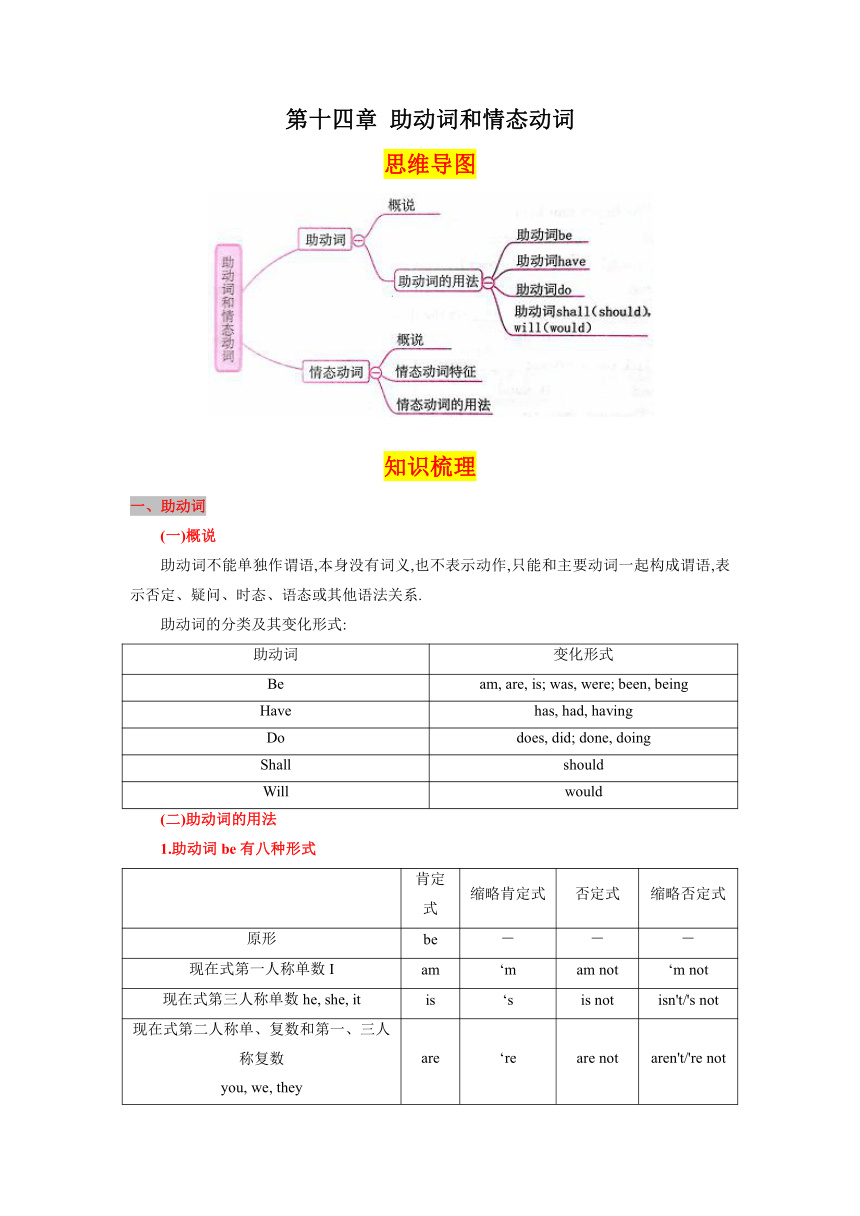
|
|
| 格式 | docx | ||
| 文件大小 | 118.6KB | ||
| 资源类型 | 教案 | ||
| 版本资源 | 通用版 | ||
| 科目 | 英语 | ||
| 更新时间 | 2023-04-04 07:05:22 | ||
图片预览

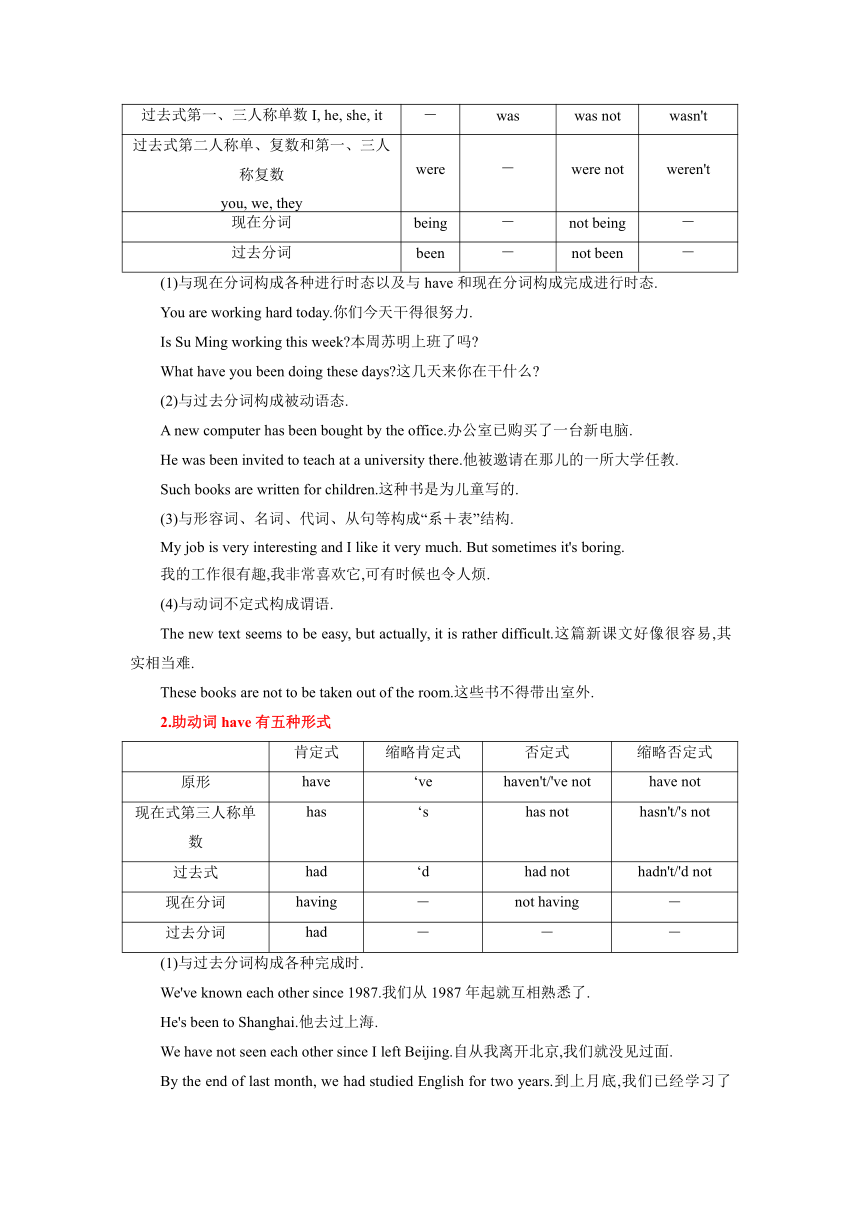
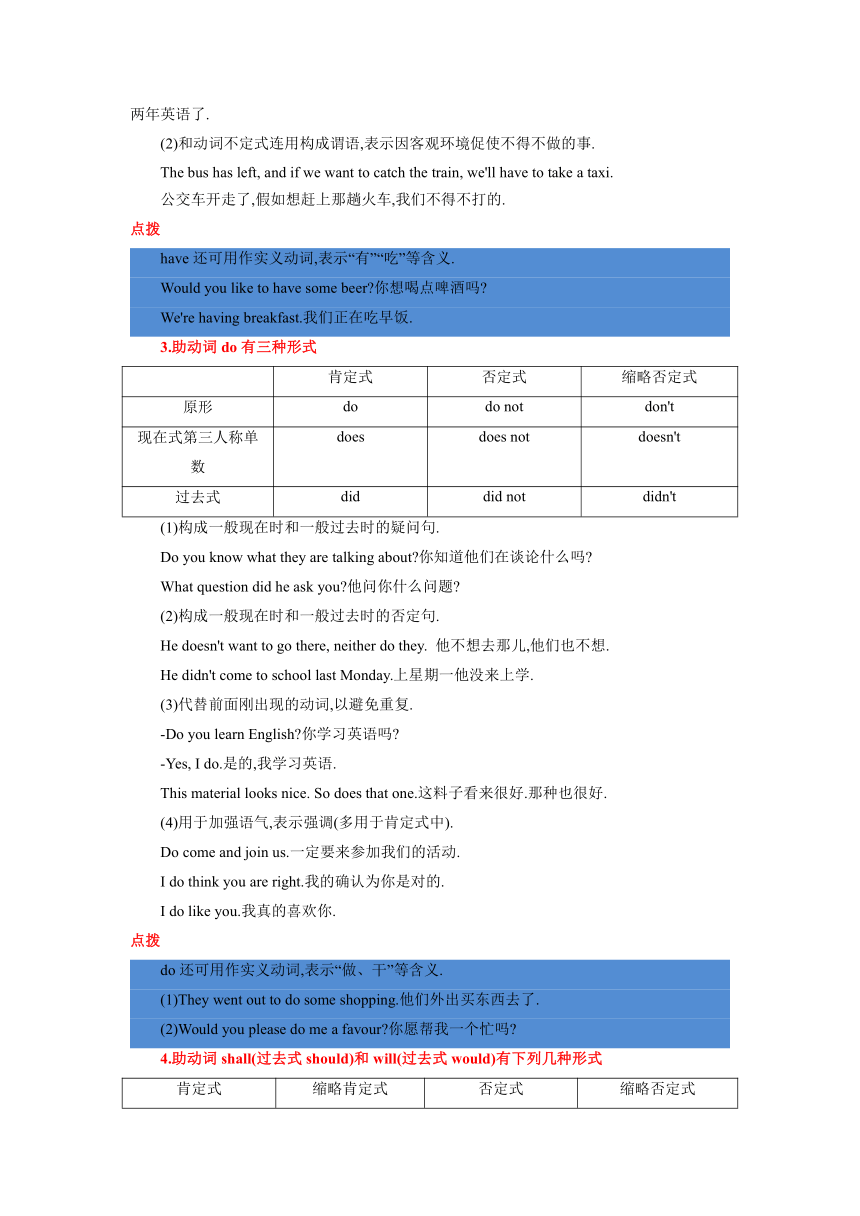
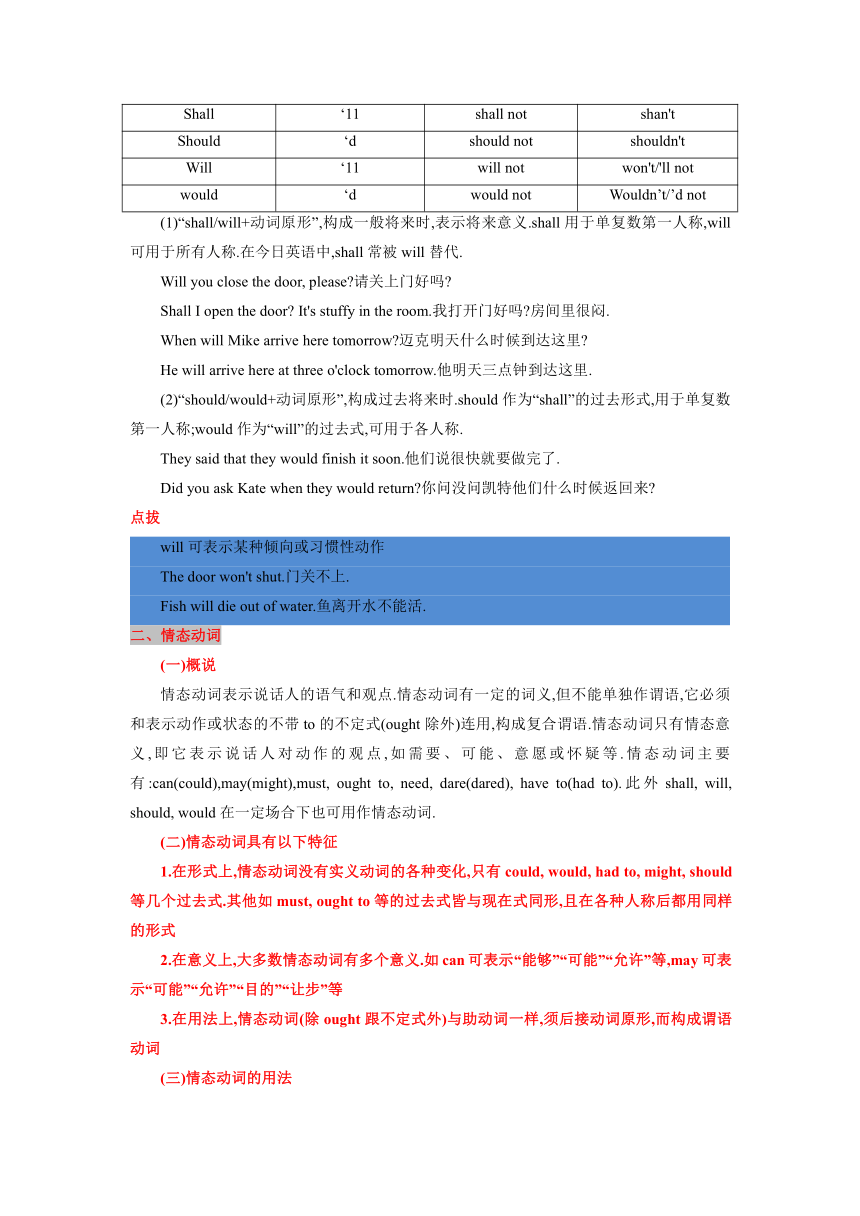
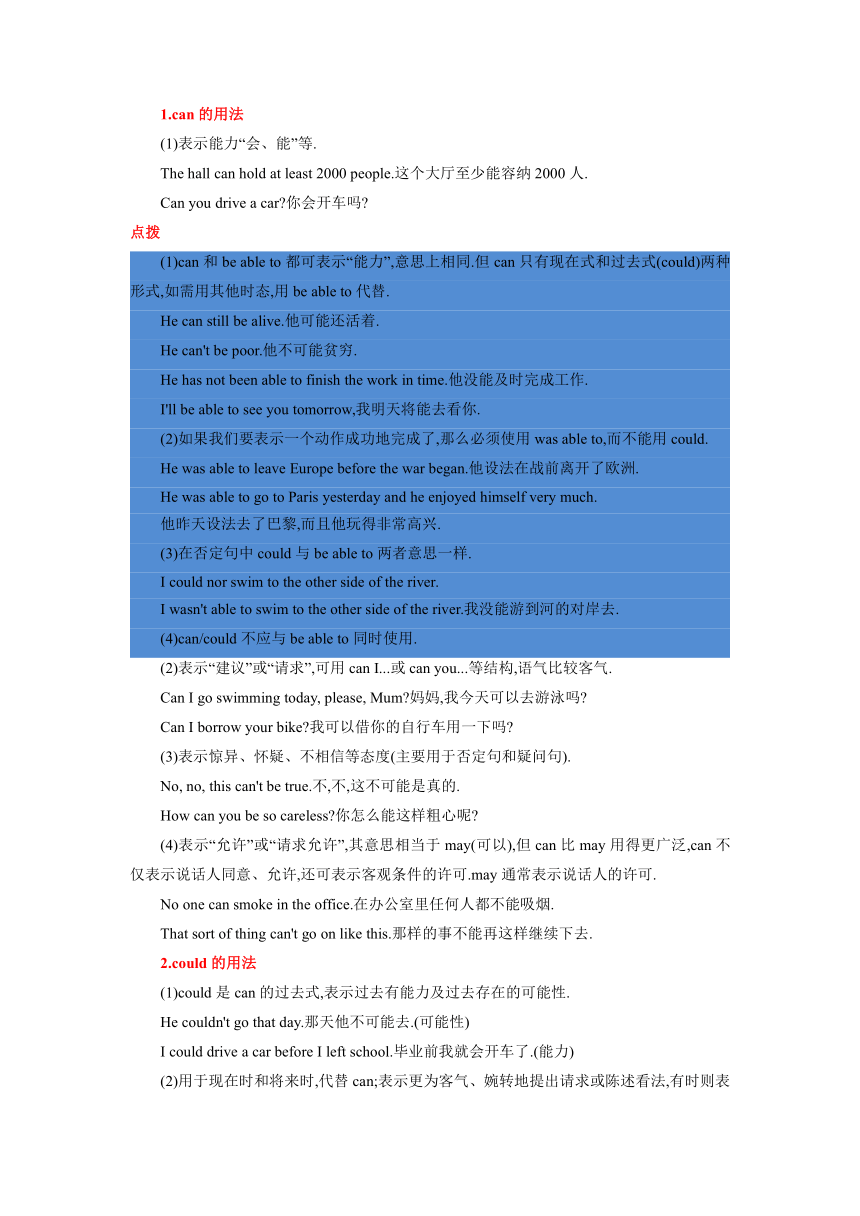
文档简介
第十四章 助动词和情态动词
思维导图
知识梳理
一、助动词
(一)概说
助动词不能单独作谓语,本身没有词义,也不表示动作,只能和主要动词一起构成谓语,表示否定、疑问、时态、语态或其他语法关系.
助动词的分类及其变化形式:
助动词 变化形式
Be am, are, is; was, were; been, being
Have has, had, having
Do does, did; done, doing
Shall should
Will would
(二)助动词的用法
1.助动词be有八种形式
肯定式 缩略肯定式 否定式 缩略否定式
原形 be - - -
现在式第一人称单数I am ‘m am not ‘m not
现在式第三人称单数he, she, it is ‘s is not isn't/'s not
现在式第二人称单、复数和第一、三人称复数 you, we, they are ‘re are not aren't/'re not
过去式第一、三人称单数I, he, she, it - was was not wasn't
过去式第二人称单、复数和第一、三人称复数 you, we, they were - were not weren't
现在分词 being - not being -
过去分词 been - not been -
(1)与现在分词构成各种进行时态以及与have和现在分词构成完成进行时态.
You are working hard today.你们今天干得很努力.
Is Su Ming working this week 本周苏明上班了吗
What have you been doing these days 这几天来你在干什么
(2)与过去分词构成被动语态.
A new computer has been bought by the office.办公室已购买了一台新电脑.
He was been invited to teach at a university there.他被邀请在那儿的一所大学任教.
Such books are written for children.这种书是为儿童写的.
(3)与形容词、名词、代词、从句等构成“系+表”结构.
My job is very interesting and I like it very much. But sometimes it's boring.
我的工作很有趣,我非常喜欢它,可有时候也令人烦.
(4)与动词不定式构成谓语.
The new text seems to be easy, but actually, it is rather difficult.这篇新课文好像很容易,其实相当难.
These books are not to be taken out of the room.这些书不得带出室外.
2.助动词have有五种形式
肯定式 缩略肯定式 否定式 缩略否定式
原形 have ‘ve haven't/'ve not have not
现在式第三人称单数 has ‘s has not hasn't/'s not
过去式 had ‘d had not hadn't/'d not
现在分词 having - not having -
过去分词 had - - -
(1)与过去分词构成各种完成时.
We've known each other since 1987.我们从1987年起就互相熟悉了.
He's been to Shanghai.他去过上海.
We have not seen each other since I left Beijing.自从我离开北京,我们就没见过面.
By the end of last month, we had studied English for two years.到上月底,我们已经学习了两年英语了.
(2)和动词不定式连用构成谓语,表示因客观环境促使不得不做的事.
The bus has left, and if we want to catch the train, we'll have to take a taxi.
公交车开走了,假如想赶上那趟火车,我们不得不打的.
点拨
have还可用作实义动词,表示“有”“吃”等含义.
Would you like to have some beer 你想喝点啤酒吗
We're having breakfast.我们正在吃早饭.
3.助动词do有三种形式
肯定式 否定式 缩略否定式
原形 do do not don't
现在式第三人称单数 does does not doesn't
过去式 did did not didn't
(1)构成一般现在时和一般过去时的疑问句.
Do you know what they are talking about 你知道他们在谈论什么吗
What question did he ask you 他问你什么问题
(2)构成一般现在时和一般过去时的否定句.
He doesn't want to go there, neither do they. 他不想去那儿,他们也不想.
He didn't come to school last Monday.上星期一他没来上学.
(3)代替前面刚出现的动词,以避免重复.
-Do you learn English 你学习英语吗
-Yes, I do.是的,我学习英语.
This material looks nice. So does that one.这料子看来很好.那种也很好.
(4)用于加强语气,表示强调(多用于肯定式中).
Do come and join us.一定要来参加我们的活动.
I do think you are right.我的确认为你是对的.
I do like you.我真的喜欢你.
点拨
do还可用作实义动词,表示“做、干”等含义.
(1)They went out to do some shopping.他们外出买东西去了.
(2)Would you please do me a favour 你愿帮我一个忙吗
4.助动词shall(过去式should)和will(过去式would)有下列几种形式
肯定式 缩略肯定式 否定式 缩略否定式
Shall ‘11 shall not shan't
Should ‘d should not shouldn't
Will ‘11 will not won't/'ll not
would ‘d would not Wouldn’t/’d not
(1)“shall/will+动词原形”,构成一般将来时,表示将来意义.shall用于单复数第一人称,will可用于所有人称.在今日英语中,shall常被will替代.
Will you close the door, please 请关上门好吗
Shall I open the door It's stuffy in the room.我打开门好吗 房间里很闷.
When will Mike arrive here tomorrow 迈克明天什么时候到达这里
He will arrive here at three o'clock tomorrow.他明天三点钟到达这里.
(2)“should/would+动词原形”,构成过去将来时.should作为“shall”的过去形式,用于单复数第一人称;would作为“will”的过去式,可用于各人称.
They said that they would finish it soon.他们说很快就要做完了.
Did you ask Kate when they would return 你问没问凯特他们什么时候返回来
点拔
will可表示某种倾向或习惯性动作
The door won't shut.门关不上.
Fish will die out of water.鱼离开水不能活.
二、情态动词
(一)概说
情态动词表示说话人的语气和观点.情态动词有一定的词义,但不能单独作谓语,它必须和表示动作或状态的不带to的不定式(ought除外)连用,构成复合谓语.情态动词只有情态意义,即它表示说话人对动作的观点,如需要、可能、意愿或怀疑等.情态动词主要有:can(could),may(might),must, ought to, need, dare(dared), have to(had to).此外shall, will, should, would在一定场合下也可用作情态动词.
(二)情态动词具有以下特征
1.在形式上,情态动词没有实义动词的各种变化,只有could, would, had to, might, should等几个过去式.其他如must, ought to等的过去式皆与现在式同形,且在各种人称后都用同样的形式
2.在意义上,大多数情态动词有多个意义.如can可表示“能够”“可能”“允许”等,may可表示“可能”“允许”“目的”“让步”等
3.在用法上,情态动词(除ought跟不定式外)与助动词一样,须后接动词原形,而构成谓语动词
(三)情态动词的用法
1.can的用法
(1)表示能力“会、能”等.
The hall can hold at least 2000 people.这个大厅至少能容纳2000人.
Can you drive a car 你会开车吗
点拨
(1)can和be able to都可表示“能力”,意思上相同.但can只有现在式和过去式(could)两种形式,如需用其他时态,用be able to代替.
He can still be alive.他可能还活着.
He can't be poor.他不可能贫穷.
He has not been able to finish the work in time.他没能及时完成工作.
I'll be able to see you tomorrow,我明天将能去看你.
(2)如果我们要表示一个动作成功地完成了,那么必须使用was able to,而不能用could.
He was able to leave Europe before the war began.他设法在战前离开了欧洲.
He was able to go to Paris yesterday and he enjoyed himself very much.
他昨天设法去了巴黎,而且他玩得非常高兴.
(3)在否定句中could与be able to两者意思一样.
I could nor swim to the other side of the river.
I wasn't able to swim to the other side of the river.我没能游到河的对岸去.
(4)can/could不应与be able to同时使用.
(2)表示“建议”或“请求”,可用can I...或can you...等结构,语气比较客气.
Can I go swimming today, please, Mum 妈妈,我今天可以去游泳吗
Can I borrow your bike 我可以借你的自行车用一下吗
(3)表示惊异、怀疑、不相信等态度(主要用于否定句和疑问句).
No, no, this can't be true.不,不,这不可能是真的.
How can you be so careless 你怎么能这样粗心呢
(4)表示“允许”或“请求允许”,其意思相当于may(可以),但can比may用得更广泛,can不仅表示说话人同意、允许,还可表示客观条件的许可.may通常表示说话人的许可.
No one can smoke in the office.在办公室里任何人都不能吸烟.
That sort of thing can't go on like this.那样的事不能再这样继续下去.
2.could的用法
(1)could是can的过去式,表示过去有能力及过去存在的可能性.
He couldn't go that day.那天他不可能去.(可能性)
I could drive a car before I left school.毕业前我就会开车了.(能力)
(2)用于现在时和将来时,代替can;表示更为客气、婉转地提出请求或陈述看法,有时则表示可能性不大.
Could you tell me where I can change some money 你能告诉我在哪儿能换钱吗
Could you sign here please, Sir 先生,请在这儿签字好吗
3.may的用法
(1)表示客气或委婉的请求时用may,回答时也用may就会显得冷淡、不客气,所以最好避之而改用热情、客气的答语.
-May I come in 我可以进来吗
-Yes, please.可以,请进.
-May I borrow your bicycle 我可以借用一下你的自行车吗
-Certainly.当然可以.
(2)表示“可以”即表示说话人同意、许可,或在疑问句中,征询对方的许可.其否定式可用may not.但在表示“不可以”“不许”“禁止”“阻止”等意思时,常用must not(mustn't)代替may not.
-May I take this book out of the reading-room 这本书我可以带出阅览室吗
-No, you mustn't.不可以.
(3)表示可能.用来表示一件事或许会发生,或是某种情况可能会存在.通常只用于肯定或否定陈述句中,而不用于疑问句中.
It may rain today.今天可能下雨.
You may have another cake.你可以再吃一块蛋糕.
She may not go to the concert tonight.今晚她可能不去听音乐会了.
(4)表示祝愿.
May you succeed!祝你成功!
May all your dreams come true!愿你的理想都成为现实!
4.might的用法
(1)作为may的过去式,用来表示过去的“可能”和“允许”,多用于间接引语.
He said that the news might be true.他说这消息可能是真的.
She asked if she might have my bike.她问是否可以借用我的自行车.
(2)代替may,表示可以做的事或可能发生的事.也可用于有礼貌地提出建议或请求,意为“可以”,在这种情况下,may和might无时间上的差别,只是更客气或更婉转些.
They might have a lot of work to do.他们可能有很多事要做.
Might I have a word with you 我可以同你说句话吗
5.must的用法
(1)表示“必须”“应当”.用第一人称时,表示说话人认为有义务、有必要做某事.用第二、三人称时,表示说话人命令或要求别人做某事;在疑问句中,表示询问对方的意图.
We must love our country.我们要爱国.
I must take a day off tomorrow.我明天必须请假一天.
Soldiers must obey orders.士兵必须服从命令.
(2)must的否定式(mustn't)表示“不应该”“不许可”“不准”“禁止”等,语气比较强烈.
You mustn't speak loudly in the library.不许在图书馆大声喧哗.
We mustn't waste our time.我们不应该浪费我们的时间.
点拨
对must问句的否定回答,需要用;need not(needn't)不需要,或don't have to不必.
-Must I do my homework now 我现在必须做作业吗
-Yes, you must.是的,你非做不可.
-No, you needn't(need not)./don't have to.不,你不必现在做.
(3)表示肯定的揣测(只用于肯定句):一定、准是、必定.
The lady must be a doctor.那个女人一定是个医生.
He hasn't come yet. He must be ill.他还没来,准是病了.
Miss Gao must be in the office.高老师一定在办公室里.
This must be Wang Hai's book.这一定是王海的书.
点拨
(1)表示现在对已发生过的事情的推测,一般用“must+ have+过去分词”结构,意思是“想必是”“(过去)一定”.
If you were at the party, you must have seen Mary.你如果参加了这次聚会,准保看见了玛丽.
(2)表示对现在某个动作或即将发生的事情的推测,可以用“must be+ -ing”结构,意思是“一定”“准是”.
You must be joking!你一定是在开玩笑!
6.have to的用法
(1)表示“不得不”“必须”的意思,与must在这个意思上很接近.must强调说话者的主观看法,意为“必须”;have to强调客观的需要,意为“不得不”.
I missed the train, so I had to take a taxi.我误了火车,所以我得乘出租车.
must仅用于表示现在和将来的义务,讲述过去,要用had to.
I had to leave early because I wasn't feeling well.我不得不早点儿离开,因为我觉得不舒服.
(2)have to也可用来表示“推测”,意思是“定是”“必定是”.
She has to be(=must be) sick. She looks pale.她一定是生病了,脸色看来很苍白.
点拨
在口语中,可用have got to代替 have to.
Sorry I have got to go (=have to go) now.抱歉,我现在非走不可了.
7.need的用法
(1)need表示“需要”“必须”.作为情态动词主要用于否定句和疑问句,无时态、人称变化,后面跟动词原形.其否定式为:need not(needn't).
You needn't try to explain.你不需要解释.
She needn't come tomorrow.她明天不必来.
点拨
needn't后面跟“have+过去分词”结构,表示“过去已做了(但)没有必要做的事情”.
The question needn't have been discussed.此问题本来不需讨论的.
(2)need用作及物动词,主要用于肯定句,有人称、时态和数的变化,后接带to的不定式.其否定形式要借助于don't, doesn't或didn't;疑问形式要借助于do, does或did.
He needs to know it.他需要知道这件事.
Do you need any help 你需要帮助吗
I don't need things like that.我不需要那样的东西.
8.dare的用法
dare作为情态动词,主要用于否定句和疑问句,表示“敢于”,本身无变化(各人称都用dare),后面跟不带to的不定式,过去时用dared,其否定式为:dare not/daren't, dared not.
How dare they do such a thing 他们怎么敢做出这样的事
Dare he say so 他敢这样说吗
She knows he was wrong but she daren't tell him.她知道他错了,却不敢告诉他.
点拨
dare用作及物动词的时候更多一些.这时dare后可以跟动词不定式,用于各种结构中.
Do I dare to ask her 我敢问她吗
He didn't dare to go.他不敢去.
She did not dare to tell them the truth.她不敢对他们说真话.
9.ought to
表示“应该”做某事,常可与should互换.
You ought to be punctual.你应该守时.
Students ought not to be late for class.学生上课不应该迟到.
Ought we to answer this question now 我们应当现在就回答这个问题吗
点拨
ought to后面跟“have+过去分词”结构,表示对过去该做而未做之事的责难、后悔或遗憾的心情.
You ought to have helped her.你本该帮助她的.(却没有帮助她)
He ought to have returned these books to the library last week.
他上星期就应该把这些书还给图书馆.(却没有还书)
10.shall的用法
(1)shall作为情态动词,用于陈述句的第二、三人称,表示说话人的强烈意愿和决心,有“允诺”“警告”“命令”等含义,意思是“必须”.
You shall come whenever you are wanted.什么时候叫你就要什么时候到.(强制)
You shall not leave your post.你不得离开岗位.(警告)
He shall get the answer tomorrow.他明天可以得到答复.(允诺)
(2)shall作为情态动词,在疑问句中可用于第一、三人称,表示征询对方意见或请求,意思是“要不要”“好不好”.
Shall he come to see you 要不要他来看你
Shall we go for walk 我们去散散步好吗
Shall I turn on the light 我要开灯吗
11.will的用法
(1)表示“意志”“意愿”,可用于多种人称.
He'll help you if you ask him.如果你请他帮忙,他是愿意帮忙的.
Will you give him a message when you see him 见到他时,请你通知他一下好吗
(2)will还可用来表示一种习惯性动作或状态,有“总是”“惯于”等意思.
Fish will die out of water.鱼儿离开水会死去.
He will talk for hours if you give him the chance.如果你给他机会,他会滔滔不绝地谈上几个钟头.
12.should的用法
(1)表示“义务或责任”,意思是“应该”.
I should speak and write English every day.我应该天天说、写英语.
We should learn from each other and help each other.我们应该互相学习,互相帮助.
(2)表示推测、预期.
They should be here by now.他们现在该到了.
Tom should know her address.估计汤姆知道她的住址.
(3)should后面跟“have+过去分词”结构,其肯定句,表示过去应该做而未做的事,其否定句则表示过去不该做但做了的事情.
He looks very tired. He should have had a good rest at home.他看上去很累了,本应该待在家里好好休息.
As an adult, he shouldn't have misunderstood it.作为成人,他本来就不应该误解这件事.
13.would
(1)would作为情态动词will的过去式,表示过去时间的“意志”“愿望”或“决心”等,可用于各人称.
I said I would do anything for him.我说过,我愿意为他做任何事.
He said he would get up earlier the next morning.他说第二天早上要早点起床.
(2)would可用来表示人的意愿、个人想法.在疑问句中用于第二人称,表示有礼貌、较婉转的请求.如:
Would you like to have a glass of tea 你要喝一杯茶吗
Would you mind closing the door 请关上门好吗
I would like to buy a silk scarf for my wife.我想给妻子买一条丝巾.
(3)would与动词连用,可表示过去反复发生的动作,相当于汉语中的“常常”“总是”等意思.如:
The old retired worker would often go to the park to play chess.这位退休老工人常常到公园去下棋.
When I was a student, I would take a walk along the country road after class.
当学生时,放学后我常常沿着乡间小路散步.
好题精练
一、用适当的助动词和情态动词填空
1.His father_________ not a lawyer.
2.He_________ two sisters and a brother.
3.I_________ never met him before I heard his speech.
4.The visitors_________ given a warm welcome.
5.Excuse me, _________ I have a look at the photo
6. _________ you work out(算出)this difficult problem without any help
7.This is a reading room. You_________ sing here.
8. _________ I speak to the headmaster, please
9. _________ you like a sandwich
10.I_________ love a cup of tea.
11.You_________ not drink and drive.
12.We_________ buy a new lock for the front door.
13.You_________ to knock at door before you come in.
14.He_________ to pass an examination before he can start work.
15. _________ you guess the answer Sorry, I can't.
16.May I come in No, you_________.
17.Your father is free now. You_________ ask him to tell you a story.
18. _________ we hand in the exercises today
No, you needn't. You_________ hand them tomorrow.
答案:
1.is 2.has 3.had 4.are 5.may
6.Can 7.mustn't 8.Could 9.Would 10.would
11.should 12.should 13.have 14.has 15.Can
16.mustn't 17.may 18.Must,may
二、选择填空
1.-What_________ it be
-It_________ be a mail box, for it is moving. It_________ be a car.
A. can; can't; must B. can; can; must C. can; mustn't; must D. must; mustn't; can
2.My mother is out. I_________ look after my little brother.
A. have to B. can C. has to D. may not
3.At that time she_________ sit here like that for hours.
A. will B. would C. had to D. shall
4.The radio says it is sunny today. You_________ take a raincoat with you.
A. can't B. needn't C. mustn't D. can
5.I_________ like Chinese tea with nothing in it.
A. would B. must C. need D. can't
6.- _________ we go out for a walk
-Good idea. What time shall we meet
A. Shall B. Let C. Will D. Must
7.He_________ to go there when he was young.
A. usedn't B. didn't use C. is used D. both A and B
8.-Must we finish our homework now, Mrs. Read
-Oh no, you_________.
A. mustn't B. can't C. won't D. needn't
9.These useful dictionaries_________ good care of.
A. must take B. must be take C. must be taken D. must to take
10.Don't be late again. You_________ be here on time.
A. must B. can C. may D. needn't
11.Tom,don't worry, you_________ get the book next morning.
A. shall B. will C. may D. can
12. _________ you swim in the river
A. Can B. Must C. May D. Need
13.Chinese must have the largest number of speakers, _________
A. mustn't they B. haven't they C. don't they D. doesn't it
14.You did not go to the party yesterday, or I_________ you.
A. would see B. could meet C. might have seen D. might see
15.-Is the boy by the window your brother
-It_________ him.
A. maybe B. may be C. would be D. need be
16.What_________ you like for breakfast
A. may B. will C. would D. can
17.- _________ you like some drink
-Yes, please.
A. Would B. Will C. Could D. Can
18.-May I throw a frisbee in the street
-No, you_________.
A. may not B .mustn't C. needn't D. don't
19.-Can you mend a TV set
-No, I_________.
A. mustn't B. can't C. may not D. needn't
20.-Please don't make a noise.
-_________.I'll be as quiet as a mouse.
A. Yes, I won't B. No, I won't C. No, I will D. Yes, I will
21.The traffic_________ stop when lights are red.
A. must B. may C. can D. mustn't
22.- _________ I ask you a question, please
-Yes, please.
A. May B. Must C. Need D. Will
23.Go and ask Mr. Wu. He_________ tell you1 how to use the dictionary.
A. may B. should C. would D. could
24. _________ you please tell me the way to the station
A. Shall B. Would C. May D. Might
25. _________ I open the window It's hot here.
A. Must B. Will C. Shall D. Would
答案:
1-5AABBA 6-10ADDCA
11-15 BADCB 16-20 CABBB
21-25 AAABC
思维导图
知识梳理
一、助动词
(一)概说
助动词不能单独作谓语,本身没有词义,也不表示动作,只能和主要动词一起构成谓语,表示否定、疑问、时态、语态或其他语法关系.
助动词的分类及其变化形式:
助动词 变化形式
Be am, are, is; was, were; been, being
Have has, had, having
Do does, did; done, doing
Shall should
Will would
(二)助动词的用法
1.助动词be有八种形式
肯定式 缩略肯定式 否定式 缩略否定式
原形 be - - -
现在式第一人称单数I am ‘m am not ‘m not
现在式第三人称单数he, she, it is ‘s is not isn't/'s not
现在式第二人称单、复数和第一、三人称复数 you, we, they are ‘re are not aren't/'re not
过去式第一、三人称单数I, he, she, it - was was not wasn't
过去式第二人称单、复数和第一、三人称复数 you, we, they were - were not weren't
现在分词 being - not being -
过去分词 been - not been -
(1)与现在分词构成各种进行时态以及与have和现在分词构成完成进行时态.
You are working hard today.你们今天干得很努力.
Is Su Ming working this week 本周苏明上班了吗
What have you been doing these days 这几天来你在干什么
(2)与过去分词构成被动语态.
A new computer has been bought by the office.办公室已购买了一台新电脑.
He was been invited to teach at a university there.他被邀请在那儿的一所大学任教.
Such books are written for children.这种书是为儿童写的.
(3)与形容词、名词、代词、从句等构成“系+表”结构.
My job is very interesting and I like it very much. But sometimes it's boring.
我的工作很有趣,我非常喜欢它,可有时候也令人烦.
(4)与动词不定式构成谓语.
The new text seems to be easy, but actually, it is rather difficult.这篇新课文好像很容易,其实相当难.
These books are not to be taken out of the room.这些书不得带出室外.
2.助动词have有五种形式
肯定式 缩略肯定式 否定式 缩略否定式
原形 have ‘ve haven't/'ve not have not
现在式第三人称单数 has ‘s has not hasn't/'s not
过去式 had ‘d had not hadn't/'d not
现在分词 having - not having -
过去分词 had - - -
(1)与过去分词构成各种完成时.
We've known each other since 1987.我们从1987年起就互相熟悉了.
He's been to Shanghai.他去过上海.
We have not seen each other since I left Beijing.自从我离开北京,我们就没见过面.
By the end of last month, we had studied English for two years.到上月底,我们已经学习了两年英语了.
(2)和动词不定式连用构成谓语,表示因客观环境促使不得不做的事.
The bus has left, and if we want to catch the train, we'll have to take a taxi.
公交车开走了,假如想赶上那趟火车,我们不得不打的.
点拨
have还可用作实义动词,表示“有”“吃”等含义.
Would you like to have some beer 你想喝点啤酒吗
We're having breakfast.我们正在吃早饭.
3.助动词do有三种形式
肯定式 否定式 缩略否定式
原形 do do not don't
现在式第三人称单数 does does not doesn't
过去式 did did not didn't
(1)构成一般现在时和一般过去时的疑问句.
Do you know what they are talking about 你知道他们在谈论什么吗
What question did he ask you 他问你什么问题
(2)构成一般现在时和一般过去时的否定句.
He doesn't want to go there, neither do they. 他不想去那儿,他们也不想.
He didn't come to school last Monday.上星期一他没来上学.
(3)代替前面刚出现的动词,以避免重复.
-Do you learn English 你学习英语吗
-Yes, I do.是的,我学习英语.
This material looks nice. So does that one.这料子看来很好.那种也很好.
(4)用于加强语气,表示强调(多用于肯定式中).
Do come and join us.一定要来参加我们的活动.
I do think you are right.我的确认为你是对的.
I do like you.我真的喜欢你.
点拨
do还可用作实义动词,表示“做、干”等含义.
(1)They went out to do some shopping.他们外出买东西去了.
(2)Would you please do me a favour 你愿帮我一个忙吗
4.助动词shall(过去式should)和will(过去式would)有下列几种形式
肯定式 缩略肯定式 否定式 缩略否定式
Shall ‘11 shall not shan't
Should ‘d should not shouldn't
Will ‘11 will not won't/'ll not
would ‘d would not Wouldn’t/’d not
(1)“shall/will+动词原形”,构成一般将来时,表示将来意义.shall用于单复数第一人称,will可用于所有人称.在今日英语中,shall常被will替代.
Will you close the door, please 请关上门好吗
Shall I open the door It's stuffy in the room.我打开门好吗 房间里很闷.
When will Mike arrive here tomorrow 迈克明天什么时候到达这里
He will arrive here at three o'clock tomorrow.他明天三点钟到达这里.
(2)“should/would+动词原形”,构成过去将来时.should作为“shall”的过去形式,用于单复数第一人称;would作为“will”的过去式,可用于各人称.
They said that they would finish it soon.他们说很快就要做完了.
Did you ask Kate when they would return 你问没问凯特他们什么时候返回来
点拔
will可表示某种倾向或习惯性动作
The door won't shut.门关不上.
Fish will die out of water.鱼离开水不能活.
二、情态动词
(一)概说
情态动词表示说话人的语气和观点.情态动词有一定的词义,但不能单独作谓语,它必须和表示动作或状态的不带to的不定式(ought除外)连用,构成复合谓语.情态动词只有情态意义,即它表示说话人对动作的观点,如需要、可能、意愿或怀疑等.情态动词主要有:can(could),may(might),must, ought to, need, dare(dared), have to(had to).此外shall, will, should, would在一定场合下也可用作情态动词.
(二)情态动词具有以下特征
1.在形式上,情态动词没有实义动词的各种变化,只有could, would, had to, might, should等几个过去式.其他如must, ought to等的过去式皆与现在式同形,且在各种人称后都用同样的形式
2.在意义上,大多数情态动词有多个意义.如can可表示“能够”“可能”“允许”等,may可表示“可能”“允许”“目的”“让步”等
3.在用法上,情态动词(除ought跟不定式外)与助动词一样,须后接动词原形,而构成谓语动词
(三)情态动词的用法
1.can的用法
(1)表示能力“会、能”等.
The hall can hold at least 2000 people.这个大厅至少能容纳2000人.
Can you drive a car 你会开车吗
点拨
(1)can和be able to都可表示“能力”,意思上相同.但can只有现在式和过去式(could)两种形式,如需用其他时态,用be able to代替.
He can still be alive.他可能还活着.
He can't be poor.他不可能贫穷.
He has not been able to finish the work in time.他没能及时完成工作.
I'll be able to see you tomorrow,我明天将能去看你.
(2)如果我们要表示一个动作成功地完成了,那么必须使用was able to,而不能用could.
He was able to leave Europe before the war began.他设法在战前离开了欧洲.
He was able to go to Paris yesterday and he enjoyed himself very much.
他昨天设法去了巴黎,而且他玩得非常高兴.
(3)在否定句中could与be able to两者意思一样.
I could nor swim to the other side of the river.
I wasn't able to swim to the other side of the river.我没能游到河的对岸去.
(4)can/could不应与be able to同时使用.
(2)表示“建议”或“请求”,可用can I...或can you...等结构,语气比较客气.
Can I go swimming today, please, Mum 妈妈,我今天可以去游泳吗
Can I borrow your bike 我可以借你的自行车用一下吗
(3)表示惊异、怀疑、不相信等态度(主要用于否定句和疑问句).
No, no, this can't be true.不,不,这不可能是真的.
How can you be so careless 你怎么能这样粗心呢
(4)表示“允许”或“请求允许”,其意思相当于may(可以),但can比may用得更广泛,can不仅表示说话人同意、允许,还可表示客观条件的许可.may通常表示说话人的许可.
No one can smoke in the office.在办公室里任何人都不能吸烟.
That sort of thing can't go on like this.那样的事不能再这样继续下去.
2.could的用法
(1)could是can的过去式,表示过去有能力及过去存在的可能性.
He couldn't go that day.那天他不可能去.(可能性)
I could drive a car before I left school.毕业前我就会开车了.(能力)
(2)用于现在时和将来时,代替can;表示更为客气、婉转地提出请求或陈述看法,有时则表示可能性不大.
Could you tell me where I can change some money 你能告诉我在哪儿能换钱吗
Could you sign here please, Sir 先生,请在这儿签字好吗
3.may的用法
(1)表示客气或委婉的请求时用may,回答时也用may就会显得冷淡、不客气,所以最好避之而改用热情、客气的答语.
-May I come in 我可以进来吗
-Yes, please.可以,请进.
-May I borrow your bicycle 我可以借用一下你的自行车吗
-Certainly.当然可以.
(2)表示“可以”即表示说话人同意、许可,或在疑问句中,征询对方的许可.其否定式可用may not.但在表示“不可以”“不许”“禁止”“阻止”等意思时,常用must not(mustn't)代替may not.
-May I take this book out of the reading-room 这本书我可以带出阅览室吗
-No, you mustn't.不可以.
(3)表示可能.用来表示一件事或许会发生,或是某种情况可能会存在.通常只用于肯定或否定陈述句中,而不用于疑问句中.
It may rain today.今天可能下雨.
You may have another cake.你可以再吃一块蛋糕.
She may not go to the concert tonight.今晚她可能不去听音乐会了.
(4)表示祝愿.
May you succeed!祝你成功!
May all your dreams come true!愿你的理想都成为现实!
4.might的用法
(1)作为may的过去式,用来表示过去的“可能”和“允许”,多用于间接引语.
He said that the news might be true.他说这消息可能是真的.
She asked if she might have my bike.她问是否可以借用我的自行车.
(2)代替may,表示可以做的事或可能发生的事.也可用于有礼貌地提出建议或请求,意为“可以”,在这种情况下,may和might无时间上的差别,只是更客气或更婉转些.
They might have a lot of work to do.他们可能有很多事要做.
Might I have a word with you 我可以同你说句话吗
5.must的用法
(1)表示“必须”“应当”.用第一人称时,表示说话人认为有义务、有必要做某事.用第二、三人称时,表示说话人命令或要求别人做某事;在疑问句中,表示询问对方的意图.
We must love our country.我们要爱国.
I must take a day off tomorrow.我明天必须请假一天.
Soldiers must obey orders.士兵必须服从命令.
(2)must的否定式(mustn't)表示“不应该”“不许可”“不准”“禁止”等,语气比较强烈.
You mustn't speak loudly in the library.不许在图书馆大声喧哗.
We mustn't waste our time.我们不应该浪费我们的时间.
点拨
对must问句的否定回答,需要用;need not(needn't)不需要,或don't have to不必.
-Must I do my homework now 我现在必须做作业吗
-Yes, you must.是的,你非做不可.
-No, you needn't(need not)./don't have to.不,你不必现在做.
(3)表示肯定的揣测(只用于肯定句):一定、准是、必定.
The lady must be a doctor.那个女人一定是个医生.
He hasn't come yet. He must be ill.他还没来,准是病了.
Miss Gao must be in the office.高老师一定在办公室里.
This must be Wang Hai's book.这一定是王海的书.
点拨
(1)表示现在对已发生过的事情的推测,一般用“must+ have+过去分词”结构,意思是“想必是”“(过去)一定”.
If you were at the party, you must have seen Mary.你如果参加了这次聚会,准保看见了玛丽.
(2)表示对现在某个动作或即将发生的事情的推测,可以用“must be+ -ing”结构,意思是“一定”“准是”.
You must be joking!你一定是在开玩笑!
6.have to的用法
(1)表示“不得不”“必须”的意思,与must在这个意思上很接近.must强调说话者的主观看法,意为“必须”;have to强调客观的需要,意为“不得不”.
I missed the train, so I had to take a taxi.我误了火车,所以我得乘出租车.
must仅用于表示现在和将来的义务,讲述过去,要用had to.
I had to leave early because I wasn't feeling well.我不得不早点儿离开,因为我觉得不舒服.
(2)have to也可用来表示“推测”,意思是“定是”“必定是”.
She has to be(=must be) sick. She looks pale.她一定是生病了,脸色看来很苍白.
点拨
在口语中,可用have got to代替 have to.
Sorry I have got to go (=have to go) now.抱歉,我现在非走不可了.
7.need的用法
(1)need表示“需要”“必须”.作为情态动词主要用于否定句和疑问句,无时态、人称变化,后面跟动词原形.其否定式为:need not(needn't).
You needn't try to explain.你不需要解释.
She needn't come tomorrow.她明天不必来.
点拨
needn't后面跟“have+过去分词”结构,表示“过去已做了(但)没有必要做的事情”.
The question needn't have been discussed.此问题本来不需讨论的.
(2)need用作及物动词,主要用于肯定句,有人称、时态和数的变化,后接带to的不定式.其否定形式要借助于don't, doesn't或didn't;疑问形式要借助于do, does或did.
He needs to know it.他需要知道这件事.
Do you need any help 你需要帮助吗
I don't need things like that.我不需要那样的东西.
8.dare的用法
dare作为情态动词,主要用于否定句和疑问句,表示“敢于”,本身无变化(各人称都用dare),后面跟不带to的不定式,过去时用dared,其否定式为:dare not/daren't, dared not.
How dare they do such a thing 他们怎么敢做出这样的事
Dare he say so 他敢这样说吗
She knows he was wrong but she daren't tell him.她知道他错了,却不敢告诉他.
点拨
dare用作及物动词的时候更多一些.这时dare后可以跟动词不定式,用于各种结构中.
Do I dare to ask her 我敢问她吗
He didn't dare to go.他不敢去.
She did not dare to tell them the truth.她不敢对他们说真话.
9.ought to
表示“应该”做某事,常可与should互换.
You ought to be punctual.你应该守时.
Students ought not to be late for class.学生上课不应该迟到.
Ought we to answer this question now 我们应当现在就回答这个问题吗
点拨
ought to后面跟“have+过去分词”结构,表示对过去该做而未做之事的责难、后悔或遗憾的心情.
You ought to have helped her.你本该帮助她的.(却没有帮助她)
He ought to have returned these books to the library last week.
他上星期就应该把这些书还给图书馆.(却没有还书)
10.shall的用法
(1)shall作为情态动词,用于陈述句的第二、三人称,表示说话人的强烈意愿和决心,有“允诺”“警告”“命令”等含义,意思是“必须”.
You shall come whenever you are wanted.什么时候叫你就要什么时候到.(强制)
You shall not leave your post.你不得离开岗位.(警告)
He shall get the answer tomorrow.他明天可以得到答复.(允诺)
(2)shall作为情态动词,在疑问句中可用于第一、三人称,表示征询对方意见或请求,意思是“要不要”“好不好”.
Shall he come to see you 要不要他来看你
Shall we go for walk 我们去散散步好吗
Shall I turn on the light 我要开灯吗
11.will的用法
(1)表示“意志”“意愿”,可用于多种人称.
He'll help you if you ask him.如果你请他帮忙,他是愿意帮忙的.
Will you give him a message when you see him 见到他时,请你通知他一下好吗
(2)will还可用来表示一种习惯性动作或状态,有“总是”“惯于”等意思.
Fish will die out of water.鱼儿离开水会死去.
He will talk for hours if you give him the chance.如果你给他机会,他会滔滔不绝地谈上几个钟头.
12.should的用法
(1)表示“义务或责任”,意思是“应该”.
I should speak and write English every day.我应该天天说、写英语.
We should learn from each other and help each other.我们应该互相学习,互相帮助.
(2)表示推测、预期.
They should be here by now.他们现在该到了.
Tom should know her address.估计汤姆知道她的住址.
(3)should后面跟“have+过去分词”结构,其肯定句,表示过去应该做而未做的事,其否定句则表示过去不该做但做了的事情.
He looks very tired. He should have had a good rest at home.他看上去很累了,本应该待在家里好好休息.
As an adult, he shouldn't have misunderstood it.作为成人,他本来就不应该误解这件事.
13.would
(1)would作为情态动词will的过去式,表示过去时间的“意志”“愿望”或“决心”等,可用于各人称.
I said I would do anything for him.我说过,我愿意为他做任何事.
He said he would get up earlier the next morning.他说第二天早上要早点起床.
(2)would可用来表示人的意愿、个人想法.在疑问句中用于第二人称,表示有礼貌、较婉转的请求.如:
Would you like to have a glass of tea 你要喝一杯茶吗
Would you mind closing the door 请关上门好吗
I would like to buy a silk scarf for my wife.我想给妻子买一条丝巾.
(3)would与动词连用,可表示过去反复发生的动作,相当于汉语中的“常常”“总是”等意思.如:
The old retired worker would often go to the park to play chess.这位退休老工人常常到公园去下棋.
When I was a student, I would take a walk along the country road after class.
当学生时,放学后我常常沿着乡间小路散步.
好题精练
一、用适当的助动词和情态动词填空
1.His father_________ not a lawyer.
2.He_________ two sisters and a brother.
3.I_________ never met him before I heard his speech.
4.The visitors_________ given a warm welcome.
5.Excuse me, _________ I have a look at the photo
6. _________ you work out(算出)this difficult problem without any help
7.This is a reading room. You_________ sing here.
8. _________ I speak to the headmaster, please
9. _________ you like a sandwich
10.I_________ love a cup of tea.
11.You_________ not drink and drive.
12.We_________ buy a new lock for the front door.
13.You_________ to knock at door before you come in.
14.He_________ to pass an examination before he can start work.
15. _________ you guess the answer Sorry, I can't.
16.May I come in No, you_________.
17.Your father is free now. You_________ ask him to tell you a story.
18. _________ we hand in the exercises today
No, you needn't. You_________ hand them tomorrow.
答案:
1.is 2.has 3.had 4.are 5.may
6.Can 7.mustn't 8.Could 9.Would 10.would
11.should 12.should 13.have 14.has 15.Can
16.mustn't 17.may 18.Must,may
二、选择填空
1.-What_________ it be
-It_________ be a mail box, for it is moving. It_________ be a car.
A. can; can't; must B. can; can; must C. can; mustn't; must D. must; mustn't; can
2.My mother is out. I_________ look after my little brother.
A. have to B. can C. has to D. may not
3.At that time she_________ sit here like that for hours.
A. will B. would C. had to D. shall
4.The radio says it is sunny today. You_________ take a raincoat with you.
A. can't B. needn't C. mustn't D. can
5.I_________ like Chinese tea with nothing in it.
A. would B. must C. need D. can't
6.- _________ we go out for a walk
-Good idea. What time shall we meet
A. Shall B. Let C. Will D. Must
7.He_________ to go there when he was young.
A. usedn't B. didn't use C. is used D. both A and B
8.-Must we finish our homework now, Mrs. Read
-Oh no, you_________.
A. mustn't B. can't C. won't D. needn't
9.These useful dictionaries_________ good care of.
A. must take B. must be take C. must be taken D. must to take
10.Don't be late again. You_________ be here on time.
A. must B. can C. may D. needn't
11.Tom,don't worry, you_________ get the book next morning.
A. shall B. will C. may D. can
12. _________ you swim in the river
A. Can B. Must C. May D. Need
13.Chinese must have the largest number of speakers, _________
A. mustn't they B. haven't they C. don't they D. doesn't it
14.You did not go to the party yesterday, or I_________ you.
A. would see B. could meet C. might have seen D. might see
15.-Is the boy by the window your brother
-It_________ him.
A. maybe B. may be C. would be D. need be
16.What_________ you like for breakfast
A. may B. will C. would D. can
17.- _________ you like some drink
-Yes, please.
A. Would B. Will C. Could D. Can
18.-May I throw a frisbee in the street
-No, you_________.
A. may not B .mustn't C. needn't D. don't
19.-Can you mend a TV set
-No, I_________.
A. mustn't B. can't C. may not D. needn't
20.-Please don't make a noise.
-_________.I'll be as quiet as a mouse.
A. Yes, I won't B. No, I won't C. No, I will D. Yes, I will
21.The traffic_________ stop when lights are red.
A. must B. may C. can D. mustn't
22.- _________ I ask you a question, please
-Yes, please.
A. May B. Must C. Need D. Will
23.Go and ask Mr. Wu. He_________ tell you1 how to use the dictionary.
A. may B. should C. would D. could
24. _________ you please tell me the way to the station
A. Shall B. Would C. May D. Might
25. _________ I open the window It's hot here.
A. Must B. Will C. Shall D. Would
答案:
1-5AABBA 6-10ADDCA
11-15 BADCB 16-20 CABBB
21-25 AAABC
同课章节目录
- 词法
- 名词
- 动词和动词短语
- 动词语态
- 动词时态
- 助动词和情态动词
- 非谓语动词
- 冠词
- 代词
- 数词和量词
- 形容词副词及其比较等级
- 介词和介词短语
- 连词和感叹词
- 构词法
- 相似、相近词比较
- 句法
- 陈述句
- 一般疑问句和否定疑问句
- 特殊疑问句及选择疑问句
- 反意疑问句
- 存在句(There be句型)
- 宾语从句
- 定语从句
- 状语从句
- 主谓一致问题
- 简单句
- 并列句
- 复合句
- 主谓一致
- 主、表语从句
- 名词性从句
- 直接引语和间接引语
- 虚拟语气
- 感叹句
- 强调句
- 倒装句
- 祈使句
- 句子的成分
- 句子的分类
- 题型专区
- 单项选择部分
- 易错题
- 完形填空
- 阅读理解
- 词汇练习
- 听说训练
- 句型转换
- 补全对话
- 短文改错
- 翻译
- 书面表达
- 任务型阅读
- 语法填空
- 其他资料
